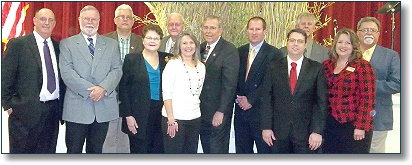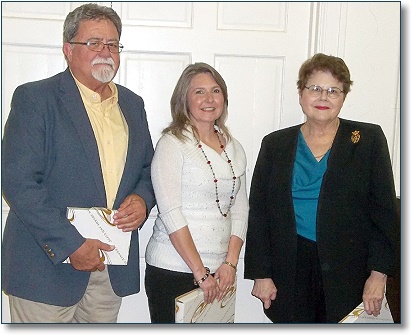Chamber banquet gets into ‘Sportsman’s
Paradise’

The Guardian-Journal photos/K.H.
Hightower
The Claiborne Chamber of Commerce hosted
its 48th annual banquet Monday night, where ‘Sportsman’s Paradise The State
We’re In’ was the theme. Louisiana Department of Wildlife and Fisheries
Secretary Charles Barham was the featured speaker. Pictured above are Chamber
Board Members, from left, John Watson, executive director, Galen White, Dwayne
Woodard, treasurer, Cynthia Steele, J.T. Taylor, vice president, Lisa
Ledbetter, president, Barham, the guest speaker, Wade Holloway, Dan Ware, Grant
Killgore, Ami Garrett and Chic Hines.

Pictured above is Claiborne Academy’s
Fellowship of Christian Athletes who served dinner during the 48th annual
Claiborne Chamber of Commerce banquet. Pictured from left are Abigail Jones,
Mr. Ed Watson, Megan Theriot, Allison Hoskins, Ann Theriot, Emily Hoskins,
Whitley Jones, Olivia Soileau, Hunter Soileau.

Pictured above are the Chosen Few who
closed out the 48th annual Claiborne Chamber of Commerce Banquet. From left are
Mary Barrington, Reid Goodwin, William Haynes, Cailey Williamson, McCall
Heckel, Scarlett Carter, Hannah Aycock, Ashlyn Heckel, Vivian Carter, Kathy
Weaver.

Pictured above are the outgoing chamber
board members, from left, Chic Hines, Lisa Ledbetter and Cynthia Steele.
The Guardian-Journal
The
48th annual Claiborne Chamber of Commerce Banquet got into the spirit of
Louisiana’s namesake, “Sportsman’s Paradise.”
Robert
Barham, secretary of Louisiana Department of Wildlife and Fisheries, was the
guest speaker for the event, and he briefly touched on all that had been going
on in the state since he began his term in office to the members of the chamber
during the 48th annual banquet on Monday, January 28. He told the audience
since he had been in office all had not been boring.
He
discussed the BP oil spill and how it will affect Gulf Coast fishing for
generations to come and also how the Morganza Spillway
flood affected the wildlife as well as the agriculture in the south Louisiana
parishes.
He also
touched on the virus deer in parts of the state suffered from for much of the
season.
Barham
made a push for the environment in the state, saying he had traveled throughout
much of the country and Louisiana had one of the “trashiest” roadway systems in
the country.
However,
he complimented Claiborne Parish saying our roads and highways were not as
littered as many of the ones he had traveled. He hoped the whole state would
begin to work on the litter problem and clean up our state’s highways.
He
closed by discussing the Flower Garden Banks, located 100-115 miles south of Louisiana
and Texas. Barham said the Flower Garden Banks National Marine Sanctuary is one
of 14 federally designated underwater areas protected by the federal
government's National Marine Sanctuary Program. The sanctuary, in the northwest
part of the Gulf of Mexico, is 56 square miles.
During
the course of the evening, guests were welcomed by outgoing Claiborne Chamber
of Commerce president Lisa Ledbetter following the Chosen Few singing the
national anthem and the pledge of allegiance led by Claiborne Parish Sheriff
Ken Bailey. The invocation was offered by Rev. R.B. Moore of the First United
Methodist Church, Homer.
Officers
and directors for the 2013 Chamber of Commerce Board include Wade Holloway,
president, J.T. Taylor, vice president, Kendra Palmer, Secretary and Dwayne
Woodard as treasurer. Board members include Janell Brown, O.P. “Pete” Pearson,
Galen White, Dan Ware, Chic Hines, Steven J. Koskie, Grant Killgore, Ami
Garrett and Kelly Loftin.
Board
members for 2012 were Lisa Ledbetter, who served as president, Taylor, Mary
Ellen Gamble, secretary and Woodard as treasurer. All other board members
remained the same. Rotating off the board this year is Ledbetter and Steele.
The
Chamber Banquet committee included Palmer, chairperson, Ledbetter, Holloway, Taylor,
Steele, Killgore and Watson.
Executive
Director John Watson gave a brief synopsis of 2012’s highlights for the
chamber. Those include adding five new chamber members, three ribbon cutting
ceremonies, supporting the Butterfly Festival in Haynesville, providing
low-cost advertising on the parish’s website (www.claiborneone.org), working
closely with Louisiana Economic Development among others.
Also,
the chamber helped with L&NW’s Claiborne Parish Santa Train, supported the
4th of July Fireworks Show on Lake Claiborne, supported the Scholastic
Achievements Awards banquet for Claiborne Parish students, helped with wall
repairs at the Ford Museum as well as with the mural painted on the side of the
Kinnebrew building.
The
chamber also worked with the Claiborne Parish Historic Committee and remained
in close contact with elected state and federal officials by inviting them to
come to Claiborne Parish and sought their support in promoting the parish. They
also worked closely with other organizations as well.
New
members for 2012 include A. Morgan’s Blooms and Rooms, Louisiana Mercantile
LLC, MMC Rehab Services, Necessities and Security Finance.
Banquet
sponsors include:
Diamond:
Capital One Bank, Citizens National Bank, First Guaranty Bank, Gibsland Bank
and Trust, R&V Works LLC.
Platinum
sponsors include: Claiborne Electric, Emerson Oil Co., Homer Memorial Hospital
and the Town of Homer.
Gold
Sponsors: Crump Oil Co., Inc., Killgore Pharmacy, Rose-Neath Funeral
Home/Kilpatrick Life Insurance Co. and Ted’s Pharmacy.
Silver
Sponsors: Avery Farms, Coca-Cola Bottling Co., of Minden, Insurance Consultants
and Rep. Patrick Jefferson.
Bronze
Sponsors: Advertising Unlimited, Barnette & Benefield Inc., Coordinating
Development Corp., FUMC Homer, James R. Hatch, Steven J. Koskie, CPA, LLC,
L&NW Railroad Co., Inc., O’Nealgas, Inc., J.T. Taylor/Dimex Sales, Dwayne
Woodard and DWCC Warden Jerry Goodwin.
Special
thanks goes to Mayor Alecia Smith and the Town of Homer for their assistance in
preparing the chamber banquet, Chosen Few of First United Methodist Church,
directed by Mary Barrington, Claiborne Parish Sheriff Ken Bailey, Claiborne
Academy’s Fellowship of Christian Athletes, the Homer Fire Department, and
R&V Works LLC and Hightower Sausage for their generous door prize donation.
Dinner
was catered by Rand and Nancy Killgore of The Upper Crust Catering, served
courtesy of Claiborne Academy’s Fellowship of Christian Athletes.
Drugs found on Minden man arrested
The Guardian-Journal
A
Minden man still sits behind bars after being arrested in Homer last Thursday.
John
William Passman, 22, was arrested by Homer Police and charged with simple
possession of marijuana with bond set at $500 and a probation and parole
warrant with no bond.
According
to reports, Homer Police picked up Passman after they were notified by
Probation and Parole that he was in the area and that he was wanted on a
warrant for a probation violation from Webster Parish. Passman was convicted in
2009 of unauthorized entry of a place of business in Caldwell Parish and
Probation and Parole wanted him because he’d violated his probation by not
following the conditions of his probation.
At the
time of Passman’s arrest, police conducted a pat-down for officer’s safety at
which time they discovered what was believed to be a small amount marijuana on
his person.
He was
placed under arrest and booked into the Claiborne Parish Detention Center.
Lt.
Roger Smith was the arresting officer.
In an
unrelated incident, a Homer man was placed under arrest and charged with disturbing
the peace with bond set at $500 and remaining after forbidden with bond set at
$500.
Police
say Pickens was highly intoxicated at the time of officers’ arrival at a
residence on East 5th Street in Homer. He was taken off the premises and taken
home by Officer Willie Fred Knowles on Thursday, January 24, however, he kept
returning to the same residence, knocking on windows and doors. This occurred
at least twice, and once, he left the premises before police arrived on scene.
The
last time he came to the residence knocking on the doors and windows of the
residence, police arrested him and charged him with the aforementioned charges.
He was then taken to the Claiborne Parish Detention Center for further booking.
The
arresting officer was Officer Ray Yetman.
Concerns raised over police pay
MICHELLE BATES, Editor
In a
special called meeting for the Homer Town Council on December 20, 2012, a Homer
police officer received an increase in pay and was put on salary, which raised
the question of its legality.
Captain
Donald Malray, by motion of District 4 Councilwoman Carlette Sanford and
seconded by District 1 Councilwoman Linda Mozeke, went from hourly pay to
salary set at $45,000 per year before supplemental pay.
The
vote to approve was unanimous, with District 2 Councilman Michael Wade absent.
Also
approved was an increase in Malray’s paid time off, which was increased from
200 hours as per police department policy, to 260 hours, which equates to about
six and one-half weeks of vacation time. Town Treasurer Shenovia Harris also
received 260 hours of paid time off.
Two
council members say the reason Malray was put on salary was to help cut the
overtime put in by the officers, which in turn helps Homer Police Chief Russell
Mills stay within his budget. This was done at the recommendation of Mills,
they said.
Any
time an officer is hired or given an increase in pay, the chief is to make a
recommendation to the town council and the council can then decide to accept
his recommendation.
Mozeke,
who sits on the police review committee, said the idea was to help Mills stay
within his budget.
“We put
him on salary to cut back on all this overtime and help (Police Chief) Russell
(Mills) with his budget,” Mozeke said.
According
to Sanford, it was to save the town money.
“There’s
a lot that we may not have understood about that,” she said. “I thought that
($45,000) was all he was going to get. I thought we were trying to do away with
the overtime and save the town money.”
Sanford
said when the council met in executive session to discuss the issue, nothing
was said about Malray being in a managerial position.
It was
presented in a manner that she said she felt would not only save the town
money, but also because Malray had been on the police force for so long.
As of
December 31, 2012, the town paid approximately $39,160.11 in overtime to its
police officers. The idea of putting one or more officers on salary was to help
cut the police department’s expenses. In 2011, every officer received a raise
when the tax was passed in 2010 to help the police department defray some of
the costs of equipment and give his officers an increase in salary.
In
2012, sales tax collection for the police department was $168,993.74, according
to the town’s budget. For 2013, the town took $350,000 of its general fund to
put into the police department’s budget, $10,000 from its contingency fund,
plus an estimated $168,000 in sales tax collection as well as all court fines
collected for the year.
However,
the court fines are split among the state and other agencies before the police
department sees its portion.
And
police pay breaks down like this. Each officer is given base pay and is paid on
an hourly basis. After a certain amount of time on a police force, officers are
given supplemental pay provided by the state.
As to
whether Malray’s pay raise and salary is legal, according to the Fair Labor
Standards Act (FLSA), it depends on his duties.
Many
people in Louisiana believe state law indicates in order for an employee to
receive salary they must be in a management position. However, that may not be
the case. Depending on Malray’s duties as a police officer, he may be able to
receive salary plus overtime.
Homer’s
special legislative charter and the Lawrason Act are silent on the issue, the
State of Louisiana is as well. According to Tiffany Dickerson, in
communications with the Louisiana Workforce Commission (Louisiana’s Department
of Labor), the state has no laws regarding this issue.
“From
the state’s perspective, Louisiana does not have a state minimum wage or
overtime law,” Dickerson said. Rather, salary and overtime laws are governed by
the FLSA -- federal law.
According
to the FLSA, most detectives and investigators are considered “nonexempt,”
therefore eligible for overtime.
“Detectives
and investigators may perform ‘off-the-clock’ work including job related
telephone calls at home (e.g., with informants, prosecutors and other
officers), police paperwork at home, going to meetings, work performed before
and after regular shifts (e.g., ‘roll calls,’ or finishing up reports without
‘putting in’ overtime), working through meal periods,” according to FLSA’s
website, www.flsa.com/police.html.
Exempt
salaried employees are not eligible for overtime, and Malray is considered
exempt, Mayor Alecia Smith said.
In
order to be considered exempt or nonexempt, an employee must meet certain
criteria. According to FLSA, job titles do not make an employee exempt from
overtime pay, even if they are on salary.
“In
order for an exemption to apply, an employee’s specific job duties and salary
must meet all the requirements of the Department’s regulations,” according to
the U.S. Department of Labor’s Fact Sheet 17A of the FLSA.
The
FLSA is long and complicated, and during research for this story, the law
showed several different duties which were considered exempt or nonexempt.
However,
the increase in Malray’s pay may not save the town any money. In fact, it may
increase what they already pay out for employees’ pay and benefits. All police
officers and their employers pay into a state retirement system, called the
Municipal Police Employee Retirement System (MPERS). Each police officer and
the officer’s employer (which would be the town) pay a portion into MPERS. Not
only does Malray’s contribution each month increase, so does the town’s.
Homer
Police Chief Russell Mills would not comment on this story, and phone calls to
Town Attorney Marcus Patillo were unreturned.
More
information can be found at www.dol.gov or www.flsa.com, overtime and wage law.
Sparta education efforts expanding
MICHELLE BATES, Editor
Efforts
to save the Sparta Aquifer are still alive and well through the Sparta
Groundwater Commission’s water conservation campaign and education.
Sparta
Commission member Rick Hohlt and Sparta Educator Lindsay Gouedy recently spoke
to the Homer Lions Club, talking about the Sparta, some of its accomplishments
and its educational program targeted at young students who will soon be the
nation’s next generation of leaders.
Hohlt
began by saying that Louisiana has an abundance of natural resources, of which
one of the most important is water. Most of North Louisiana’s water comes from
the Sparta Aquifer, not surface water, he said.
According
to statistics he provided, in 2005, North Louisiana used 68 million gallons of
water per day. By 2010, that number dropped by four million gallons, and that’s
only because the IP plant in Bastrop shut down, which used approximately four
million gallons of water.
Also, a
huge accomplishment was the undertaking of the recycling system at Graphics
Packaging in Monroe. The company, which makes paper products, was pumping 4.6
million gallons of water per day from the Sparta, Hohlt said, and now that they
are recycling gray water, that’s 4.6 million gallons that’s not coming from the
aquifer.
One
thing he did stress is that preserving the Sparta Aquifer is not just a parish
problem, or a county problem -- it’s a regional problem.
“Everybody
has to pull together to deal with this regional problem,” he said. “The Sparta
is one body of water. We have to be good stewards and think about our usage.
From the start, we have believed that we are responsible for our water.”
In
1999, when the Sparta Commission was formed, Hohlt said it was concerned people
from across the Sparta region who approached the state about forming the
commission. The state did and gave it advisory authority to study the situation
and send their recommendations to the state. They did that, but wouldn’t give
the commission any further authority to do anything about the millions of gallons
of water that’s being lost every day.
However,
Hohlt said the state has been helpful to some degree, but it’s not enough to do
much good.
He said
the commission has fought tirelessly to get the Sparta Region designated as a
critical designation, but it was quickly dubbed an “area of concern.” A
critical designation would have forced the state to look at the issues with the
Sparta more closely and come up with a plan to preserve the aquifer for future
generations.
Since
the Sparta cannot do more than it already has and is doing, it’s moved its
focus towards conservation education.
The
Sparta Commission is funded by the generous contributions of municipalities and
parishes throughout the region, which provided funding for a Sparta Educator.
Lindsay Gouedy was hired to fulfill that role, educating businesses,
organizations and the general public about conserving water and preserving the
Sparta. The focus of educations efforts quickly turned to educating children to
teach them to become responsible stewards of our most precious resource.
“We
grew up learning that water was readily available, but that’s not true today,”
she said.
She
spoke highly of Claiborne Parish saying that the annual waterfest hosted by
Claiborne 4-H and the LSU Agcenter is the model she used to bring water
conservation into other areas of the Sparta region. In Claiborne Parish, the
Waterfest is at the Lake Claiborne State Park where sixth grade children from
all schools in the parish gather to learn about water, conservation, where it comes
from and have a little fun.
The
waterfest has been expanded into several parishes, including Lincoln and soon
Webster.
With
this vital education program in place, it will still be 15 to 20 years before
any significant changes are made.
For
more information on the Sparta Aquifer or the Sparta Commission, please go to
their website www.spartaquifer.com.



